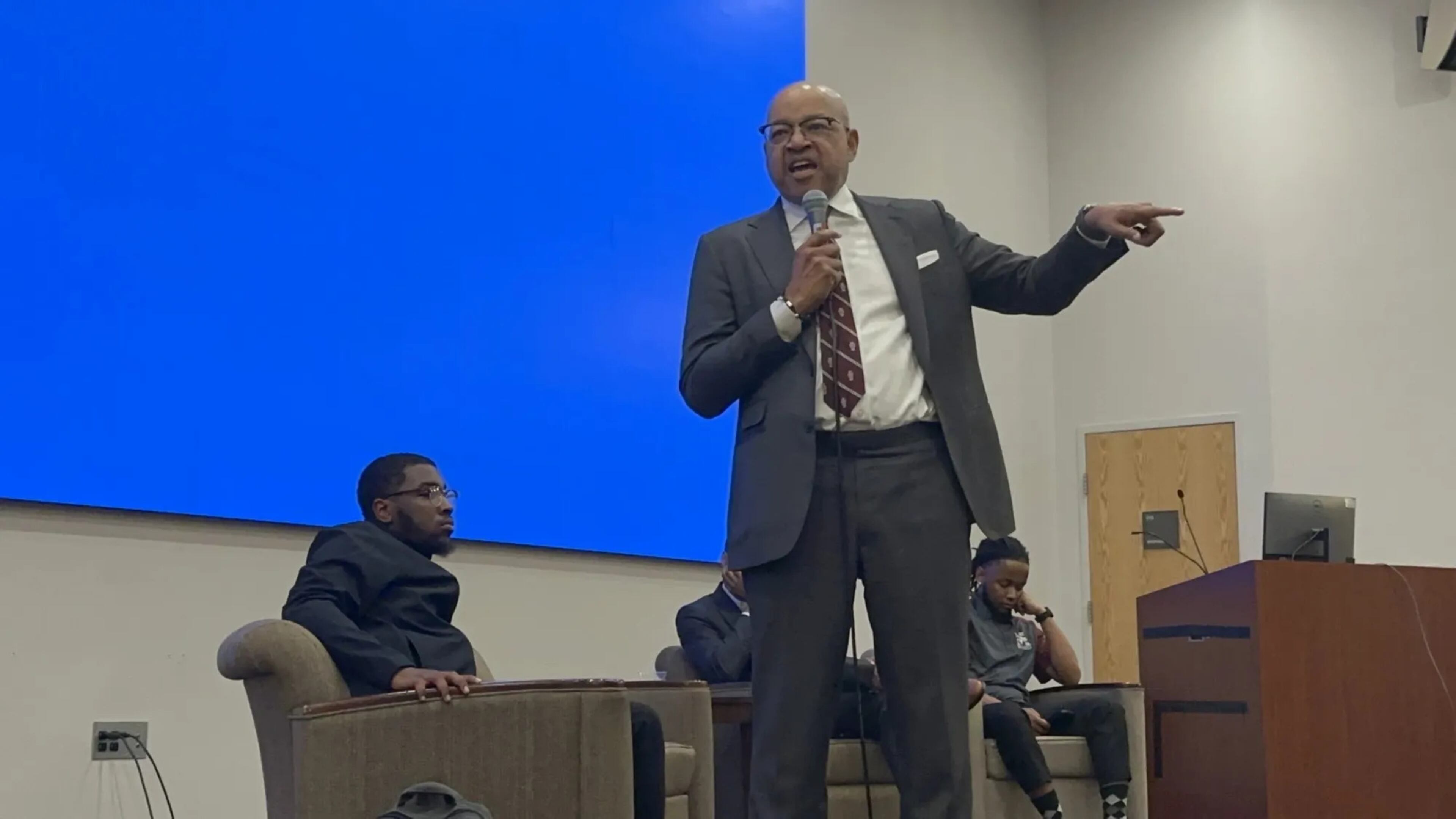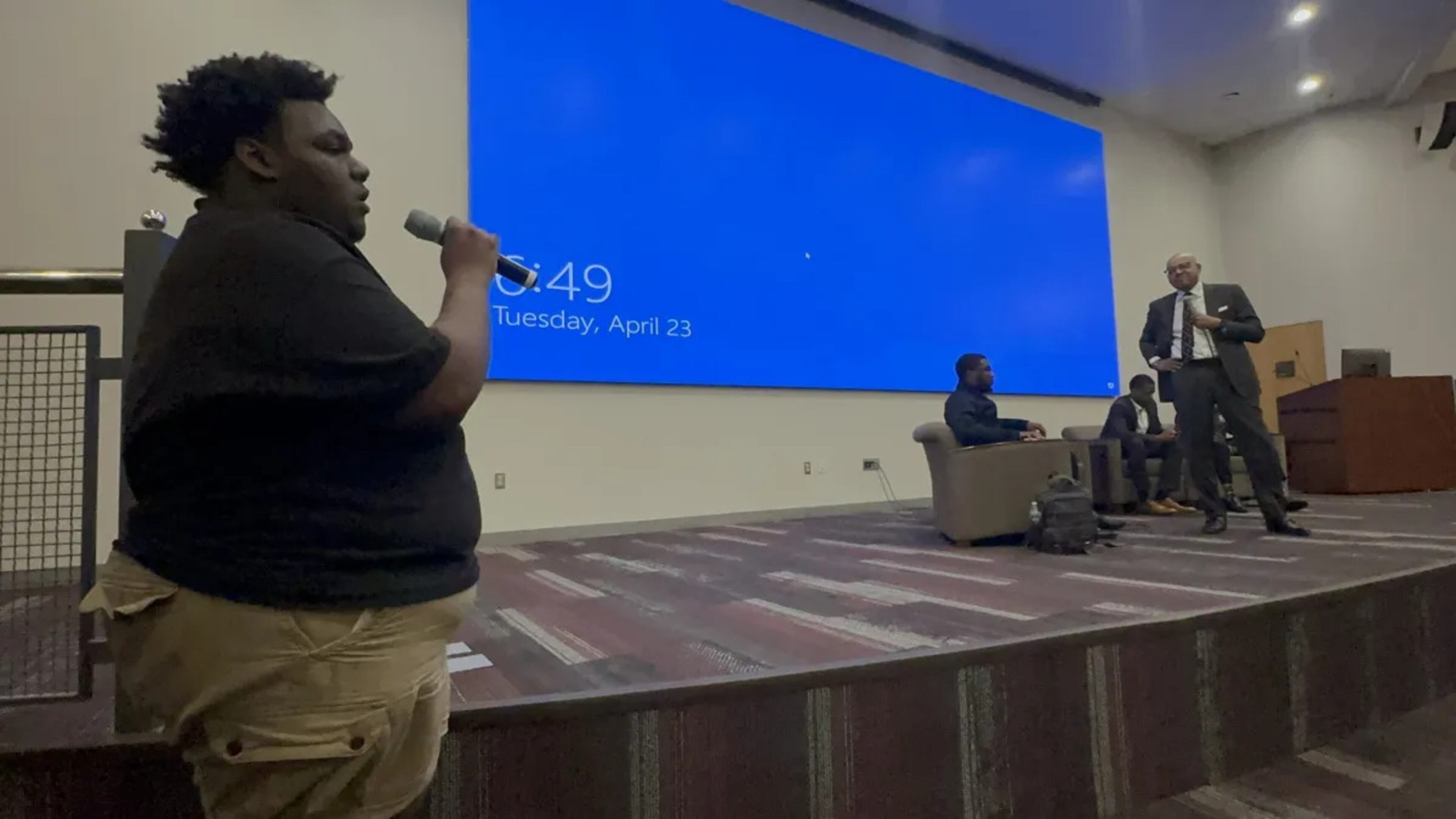Planned Biden visit to Morehouse angers Black student Gaza supporters

This story was originally published by Capital B.
Morehouse College students packed a campus auditorium Tuesday evening to voice their anger at the decision to invite President Joe Biden to deliver the historically Black institution’s commencement address next month.
Most of the estimated 50 students in attendance at Tuesday’s meeting expressed outrage and frustration at Biden’s support for Israel in its war against Hamas. The conflict has killed more than 34,000 Palestinian civilians since October. Students who spoke Tuesday expressed horror at the images of dead Palestinian women and children that they’ve seen on social media. Only one student in attendance defended Biden’s scheduled appearance.
Some worried that giving Biden a platform at Martin Luther King Jr.’s alma mater could damage the school’s reputation.
“How do you justify what you’re going to bestow on [Biden] on our behalf?” Morehouse senior Jason May asked President David A. Thomas during the town hall, noting that Biden is also due to receive an honorary degree in accordance with tradition for Morehouse commencement speakers. He characterized the president as “basically a war criminal” and argued that giving him a platform at Morehouse makes the school “complicit” in what’s happening in Gaza.

The tensions at Morehouse exemplify how some student activists’ anger at the Biden administration is causing upheaval on college campuses. This week, hundreds of pro-Palestinian student protesters were arrested and in-person classes were canceled at Columbia University in New York; its president, Minouche Shafik, now faces some calls to resign. In January, Harvard University’s first Black president, Claudine Gay, resigned amidst a controversy over her answers to questions about antisemitism on campus during a congressional hearing.
Thomas made it clear during the emergency town hall meeting that he won’t rescind his invitation to Biden despite backlash from students and faculty over the preceding 24 hours.
At HBCUs, no classes have been canceled and there’s no indication that Thomas’ job is in jeopardy at Morehouse. Still, the anger over Biden’s visit reflects a political challenge to a president whose reelection hopes might ride on Black voters, many of whom disagree with his policies on the war.
By engaging with students at the town hall, Thomas took a different approach than Columbia’s Shafik to the discord at Morehouse. He hosted the Q&A session inside the Bank of America Auditorium about 24 hours after news broke that Biden would come to the campus on May 19. He also endured personal criticism of his decision.
One young man questioned whether Thomas would benefit financially from Biden’s visit.
“I want to know if you’ve been paid to provide Biden a platform to address the student body,” the student said.
“I have not been paid. I have not been bought,” Thomas answered. “That question is an insult, but because you are a student here, I owe you the opportunity to do it. But I’m going to call it out.”
Thomas refused to answer another student’s question about if what’s happening in Gaza is a “genocide.”
At least two students who spoke Tuesday worried that Biden could use Morehouse as a campaign backdrop to help him win over Black voters in a battleground state. One called the speech “an easy photo-op” for the president, comparing it to an appearance by former President Donald Trump at a nearby Chick-Fil-A two weeks ago.
Another took issue with Biden supporting billions in military aid for Ukraine.
“There’s a supreme amount of poverty that is continuing to increase in our communities and throughout America, but we’re seeing a president who continues to shift our tax dollars overseas and continues to ignore our needs,” the student said.
But Thomas defended his stance, suggesting that a presidential visit underscores the school’s stature as an elite institution rather than undermining it.
“We have a platform at Morehouse that the world pays attention to, and we call people to that platform who are important people in the world,” he said. “The president of the United States is one of those people.”
Student protest of government policy has a long history at Morehouse and the other Atlanta University Center institutions, where student leaders helped propel the 1960s-era Civil Rights Movement.
Multiple AUC students told Capital B Atlanta they intend to protest during Biden’s planned visit, including Morehouse junior Daxton Pettus and Spelman freshman Amel Hatim Mohdali. Both Pettus and Mohdali are activist members of the student Intercommunal Coordinating Committee (SICC) who participated in a Tuesday night candlelight vigil at Spelman in support of oppressed people in Sudan, Congo, Haiti, and Gaza.
Mohdali said if the election were held today, she would choose a third-party candidate over Biden and Trump.
“It is dangerous for us to continue on this path of choosing between two parties, instead of setting up what we want as voters,” she said.
Clark Atlanta University political science professor Kurt Young said speaking at Morehouse may be a “gamble” for Biden, but the AUC may be his best bet to receive a warm reception from college students.
Young pointed out Kamala Harris received a chorus of cheers from AUC students in September, but she’s an HBCU alum and the nation’s first Black vice president. And that event took place before the Gaza war began.
“I do think he will receive a warm reception,” Young said of Biden. “Of course that doesn’t mean everyone in the audience has a monolithic view. At the end of the day, we are on a college campus, and we’re in a moment of social and political upheaval.”

MEET OUR PARTNER
Today’s story comes from our partner Capital B Atlanta, which is part of Capital B, a Black-led, nonprofit local and national news organization reporting for Black communities across the country. Visit them at atlanta.capitalbnews.org or on Twitter @CapitalB_ATL.
If you have any feedback or questions about our partnerships, you can contact Senior Manager of Partnerships Nicole Williams via email at nicole.williams@ajc.com.

